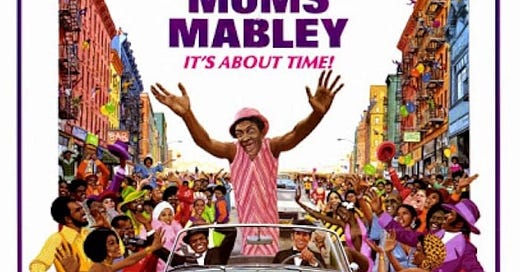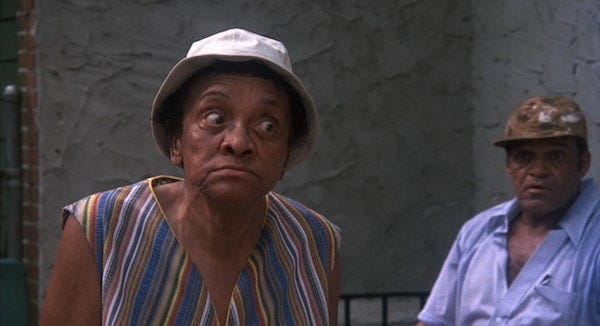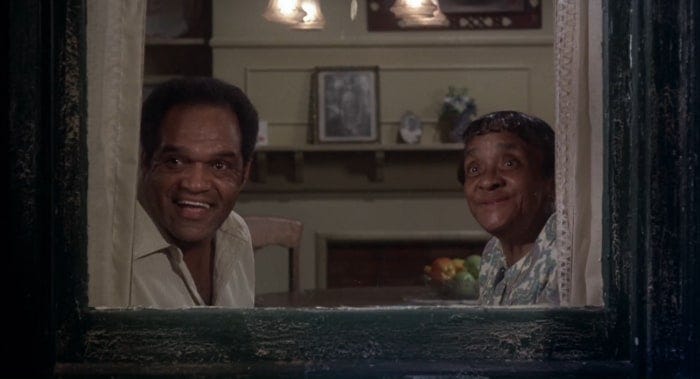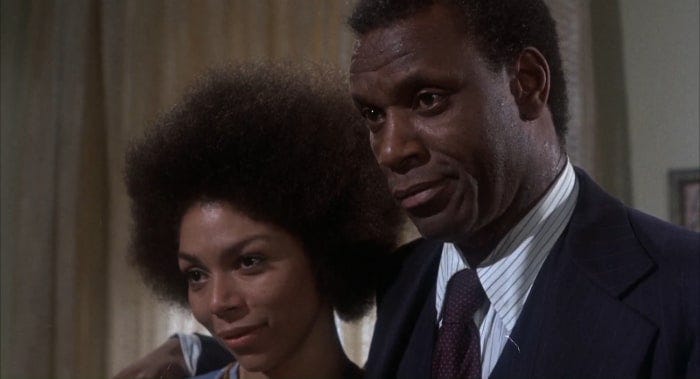Blaxploitation Education: Amazing Grace
Older comedians take advantage of the Blaxploitation trend to try to make a difference.
Amazing Grace
Written by Matt Robinson
Directed by Stan Lathan
1974
While Blaxploitation often focused on action and crime movies, it made room for other genres as well, and its refreshing to spend time in the realm of comedy every so often. In some cases, Blaxploitation also highlighted Black performers who may have been well-known in certain circles but didn’t have wide recognition, giving them a platform that hopefully introduced them to more people. It’s pretty incredible seeing people who hadn’t previously had much of a voice seizing the opportunities that had become available, and that’s just one element of Blaxploitation that is so exciting even decades later.
Amazing Grace is a comedy featuring a few performers who had been popular on the “Chitlin’ Circuit,” giving them the chance to demonstrate the skills that had clearly been honed through years of playing to audiences. It’s the kind of movie where older people stand around talking people’s ears off, and whenever anybody protests, they just tell them to shut up as they keep monologuing about whatever is on their mind. While this type of comedy had stretched back decades before this point, you can also see a clear line between it and many of the Black comedians and actors who found success in the subsequent decades, from Whoopi Goldberg to Eddie Murphy to Tyler Perry.
The central character in the movie is played by Moms Mabley, a comedian who had a fascinating career. She started performing in minstrel shows when she was a teenager in 1908, and she built fame on the Chitlin’ Circuit, becoming so well known that she was the first female comedian to perform at the Apollo Theater in 1939. She eventually performed at Carnegie Hall, appeared on several TV shows, released multiple albums, and had at least one Top 40 hit. She used her comedy to touch on issues like racism and sexuality, and she was openly gay, having come out as a lesbian in 1921.
By 1974, Mabley was in the twilight of her career, but she made the most of her only starring role in a movie. She spends Amazing Grace seeming like a force of nature, a feisty old woman who won’t take any guff from anybody. There are times when it’s hard to tell what exactly she’s saying as she mutters through her toothless gums, but that’s part of the charm. She’s the kind of wacky old person who demands respect and forces all of the younger people to fall in line and go along with her, partly because she’s right, but mostly because they’re afraid of her.
The plot of the movie involves Mabley’s character, the eponymous Grace, getting involved in the mayoral race in Baltimore. After an opening in which she returns to the city on a train along with her friend Forthwith Wilson (Slappy White, another long-time Chitlin’ Circuit comedian), who is retiring from his job as the train’s conductor, she finds that her next-door neighbor is in the midst of a campaign to become mayor. When Grace and Forthwith see the neighbor, Welton J. Waters (Moses Gunn, Shaft), having an argument with his wife Creola (Rosalind Cash, Melinda), they start eavesdropping, and they learn some information that spurs them to take action.
When Waters’ campaign manager visits, he and the candidate discuss what’s really going on with his campaign. Waters isn’t really trying to become mayor; his participation in the race is meant to siphon off the Black vote so the current mayor will be able to win the election. As a reward for this, he’s going to get to head up a $10 million urban renewal program, which the campaign manager assures him will be his best opportunity to make a difference in the Black community while also allowing him to keep a good portion of the funding for himself.
This information is enough to spur Grace and Forthwith into action, although they take different approaches. Forthwith wants to join Waters’ campaign and use his showbiz skills to get people excited, while also getting the chance to perform before what he’s sure are going to be huge audiences. Amusingly, he just knocks on Waters’ door and offers his services, saying “Here’s what I can offer you!” before doing a tap-dancing routine. This leaves the candidate confused about what exactly Forthwith wants, but he eventually offers him the opportunity to appear at an upcoming rally. However, this turns out to be a sparsely-attended meeting in a church basement, dashing Forthwith’s dreams of fame.
Grace, on the other hand, wants to try to make a real difference, bringing the corruption she has discovered to light. But as she and Forthwith continue to eavesdrop, they learn that Waters is pretty conflicted about the scheme he has become involved in. He had always wanted to be mayor, hoping to help improve the lives of the people in his community, and he earned two law degrees and learned the ins and outs of city government. But he also learned that politics requires money, mostly from white donors, so he has had little choice but to try to play the game, even if it has begun to destroy his soul.
With the understanding that Waters is a good man who has all but given up, Grace corners him and gives him a pep talk, all but forcing him to change his ways and make a real attempt to become mayor, because if he doesn’t, he’ll have to answer to her. It’s enough to light a real spark, making him believe that he might actually have a chance. Grace also provides a boost to his campaign by arranging to serve as the maid in the office of the current mayor so that she can obtain evidence of his corruption (amusingly, he openly discusses bribery and illegal uses of public funds while she’s in his office, completely ignoring her in a way that calls to mind the tactics used by the revolutionaries in The Spook Who Sat by the Door, who understood that Black people in service roles are all but invisible to powerful white men).
Waters ends up mounting a successful campaign by recruiting young people at the local college to get the word out and encourage people in the community to vote for someone who actually cares about them. Grace gives a rousing campaign speech in which she recognizes the energy that Black youth are bringing to the movement by saying, “You children are the leg and the thigh and the dark meat of God’s great chicken!” But on election night, when everybody is celebrating, she prefers to stay home on her own because she’s in the middle of preparing some string beans.
While this is a pretty entertaining movie that has a good message, encouraging community involvement while pointing out the pernicious influence of money and power in politics, its real value is to serve as a vehicle for performers that audiences may not have been able to see otherwise. Mabley and White are highly enjoyable to watch, and the movie provides just a glimpse of the talent they must have displayed over their long careers. It’s enough to make me want to search out other performances of theirs, as if my ongoing journey through the world of Blaxploitation hasn’t already opened up enough rabbit holes to explore. But it’s hard to complain when this type of digging reveals treasure.
Blaxploitation Education index:
UpTight
Cotton Comes to Harlem
Watermelon Man
The Big Doll House
Shaft
Sweet Sweetback’s Baadasssss Song
Super Fly
Buck and the Preacher
Blacula
Cool Breeze
Melinda
Slaughter
Hammer
Trouble Man
Hit Man
Black Gunn
Bone
Top of the Heap
Across 110th Street
The Legend of N***** Charley
Don’t Play Us Cheap
Shaft’s Big Score!
Non-Blaxploitation: Sounder and Lady Sings the Blues
Trick Baby
The Harder They Come
Black Mama, White Mama
Black Caesar
The Mack
Book of Numbers
Charley One-Eye
Ganja & Hess
Savage!
Coffy
Shaft in Africa
Super Fly T.N.T.
Scream Blacula Scream
Cleopatra Jones
Terminal Island
Gordon’s War
Slaughter’s Big Rip-Off!
Detroit 9000
Hit!
The Spook Who Sat by the Door
The Slams
Five on the Black Hand Side
The Black 6
Hell Up in Harlem
I Escaped From Devil’s Island
Blackenstein
The Bad Bunch
That Man Bolt
Willie Dynamite
The Arena
Black Belt Jones
Sugar Hill
Tough Guys
Foxy Brown
Thomasine & Bushrod
Black Eye
The Take
Truck Turner
Three the Hard Way








Mabley did manage to make some audio recordings during her career, so we have that as a lasting non-film record. (She also guest starred on Bill Cosby's eponymous 70s sitcom as a crotchety relation in conflict with fellow comic Mantan Moreland). Although her only top 40 hit, bizarrely, was a version of Richard Holler's protest anthem "Abraham, Martin and John", famously recorded by Dion in the pop market and Smokey Robinson & The Miracles for the R&B crowd.
She was such a beloved figure in the comedy realm that "SCTV" memorably spoofed the Joan Crawford biopic "Mommie Dearest" with "Moms Dearest", where she handed out physical abuse (with comic sound effects) to her fictional daughter "Christina" over a gooseberry pie.